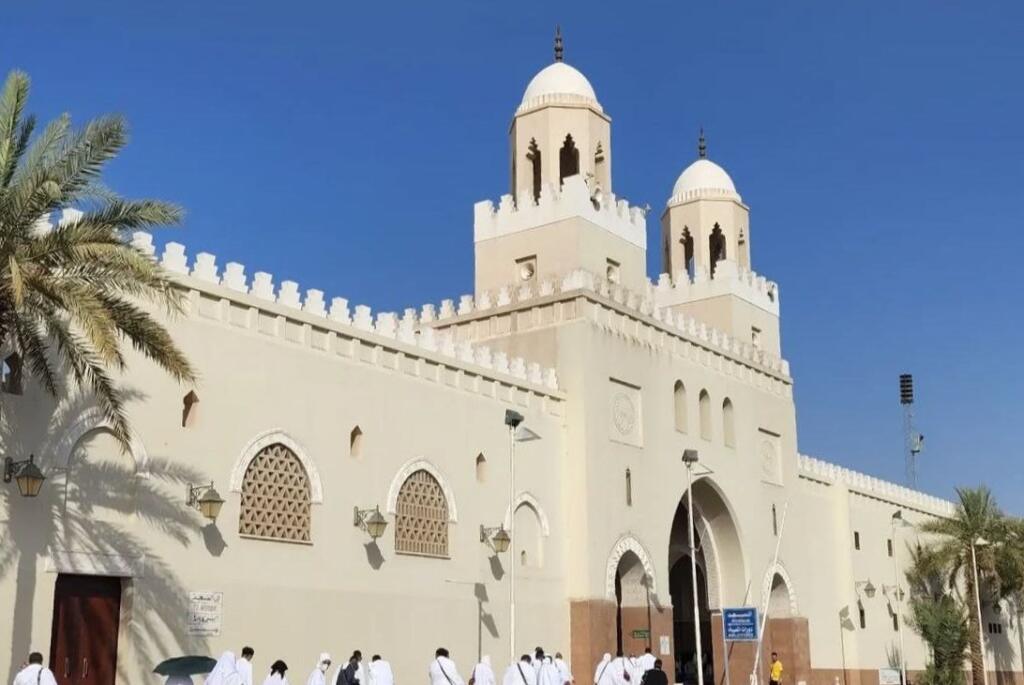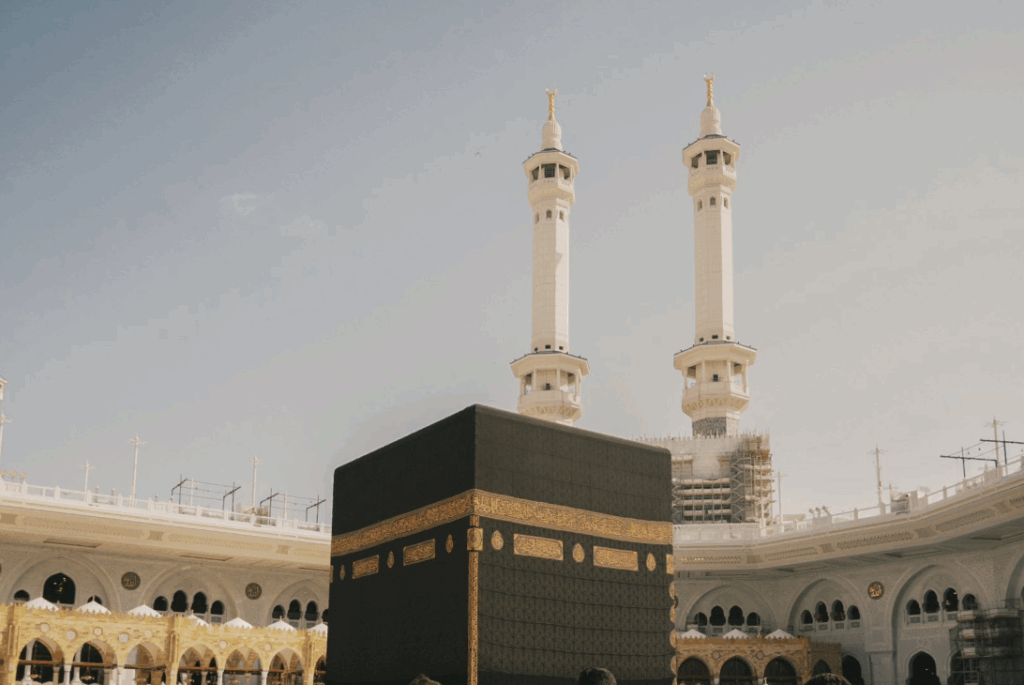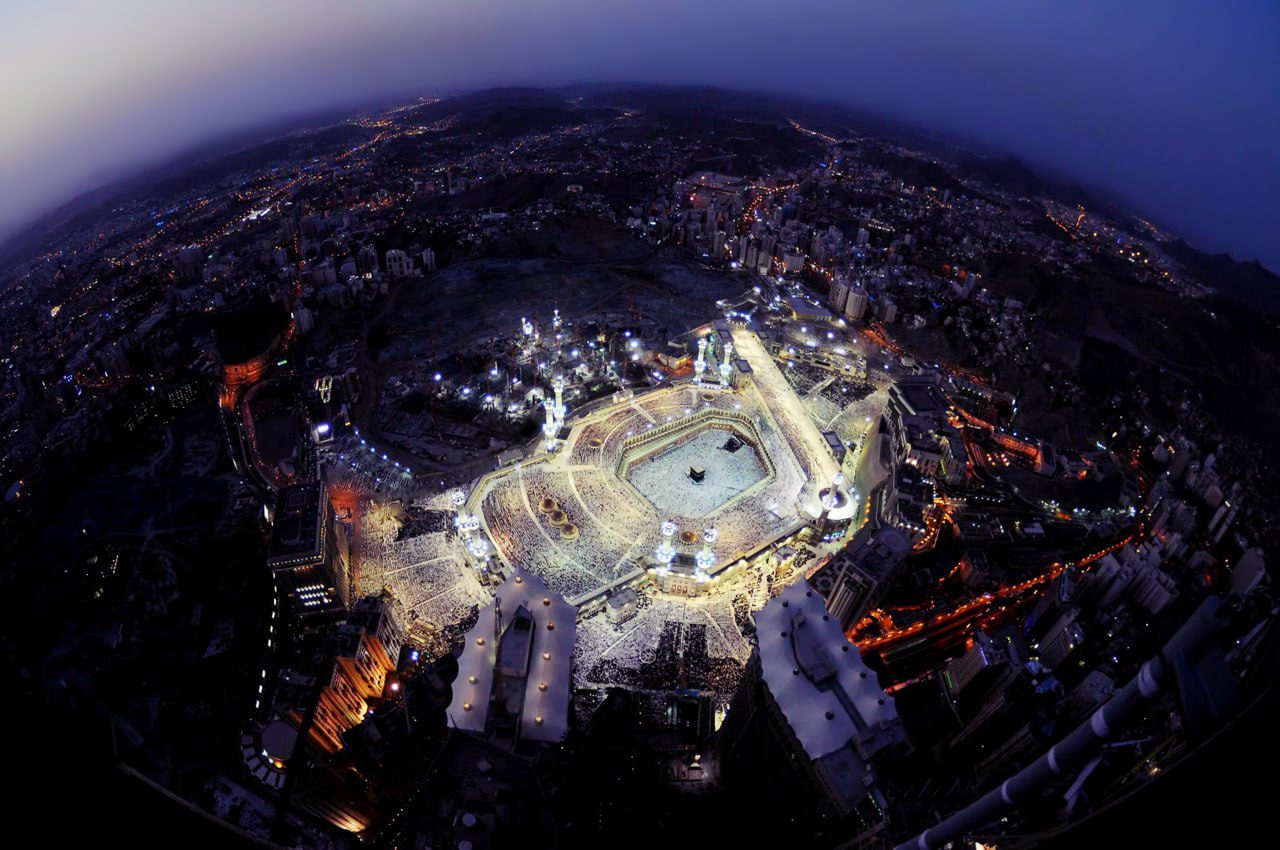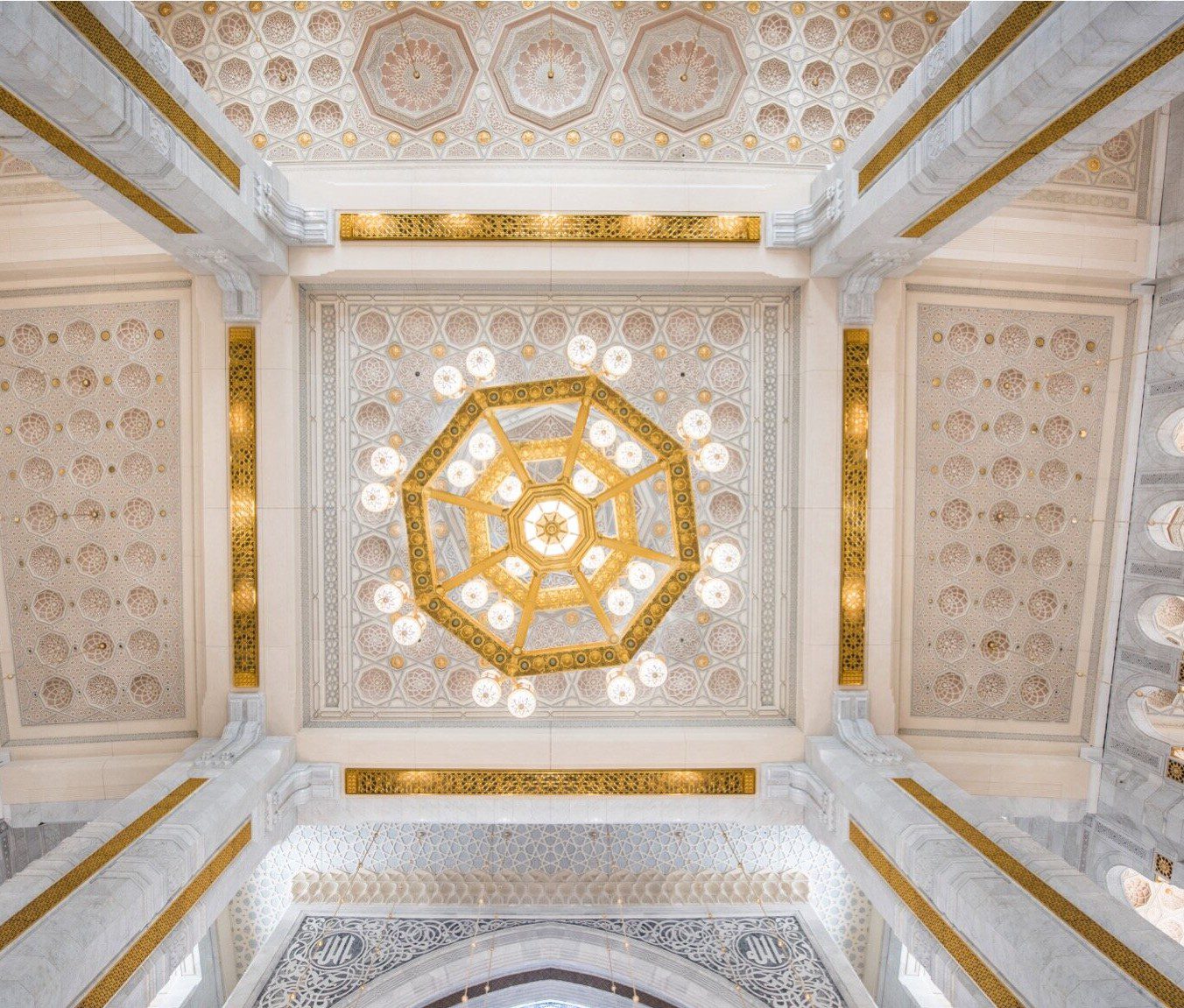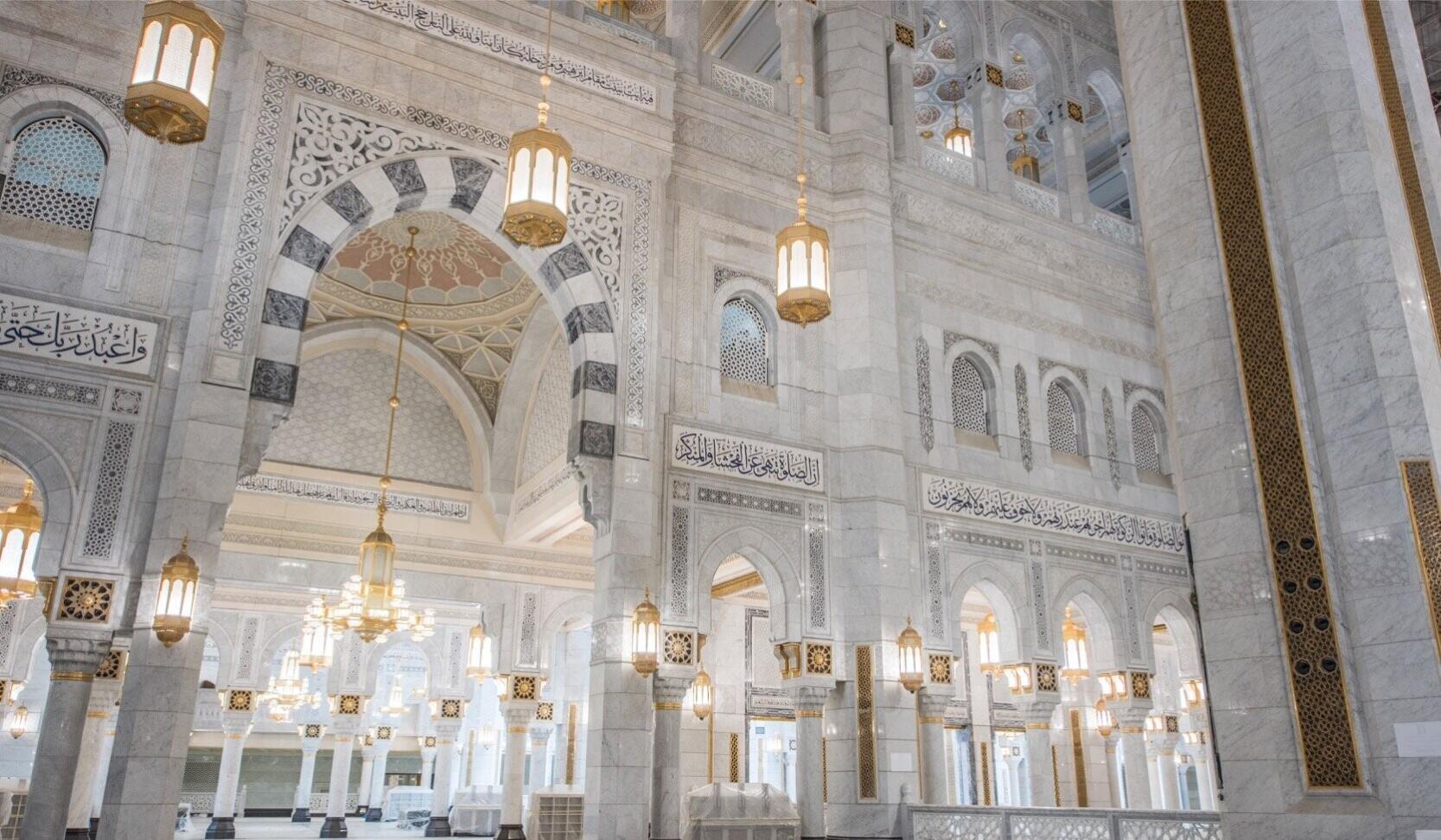After entering the state of iḥrām, start reciting the talbiyah. The talbiyah is as follows:
لَبَّيْكَ اَللّٰهُمَّ لَبَّيْكَ ، لَبَّيْكَ لاَ شَرِيْكَ لَكَ لَبَّيْكَ ، إِنَّ الْحَمْدَ وَالنِّعْمَةَ لَكَ وَالْمُلْكَ ، لاَ شَرِيْكَ لَكَ
I am here at Your service, O Allah; I am here at Your service, I am here at Your service; You have no partner whatsoever; I am here at Your service. Truly all praise, favour and sovereignty is Yours; You have no partner whatsoever” (Bukhārī).
The Prophet ﷺ encouraged the men to raise their voices with it and recite it frequently. When asked about the best type of ḥajj, he said, “The one with loud talbiyah and abundant sacrifice”(Tirmidhī). He ﷺ also said, “Jibrīl came to me and commanded me to order my Companions (radiy Allāhū ‘anhum) to raise their voices in uttering the talbiyah” (Abū Dāwūd).
Act: Recite the talbiyah frequently.
It is mustaḥabb (highly recommended) to increase reciting the talbiyah in the following times and situations:
- When meeting fellow pilgrims
- When ascending or descending terrain (e.g. hills or valleys).
- After the obligatory (farḍ) prayers
- At the end of the night.
- Sunrise and sunset.
- In al-Masjid al-Ḥarām and the masājid of Minā and ʿArafāt.
What Does the Talbiyah Mean?
لَبَّيْكَ اَللّٰهُمَّ لَبَّيْكَ
I am here at Your service, O Allah; I am here at Your service
The word ‘Labbayk’ encompasses a variety of meanings: my focus, my submission, my goal, my love, my sincerity are for you, my Lord!
- The repetition of the word labbayk is your personal pledge to your Lord: “I am here to respond to You, again and again.” The word labbayk itself is also in the dual form, which expresses repetition and continuity. It means: “I am for You: now and in the future.” This pledge is not just for ḥajj, but also for your life after ḥajj; for both your inner and outward actions.
- Submission and obedience (from labab: the collar of the animal, which is held tightly and used to subjugate). It is as if you are saying: I have submitted to you Allah, and I am humbling my soul in full obedience and submission to You.
- Commitment and staying firm (labba bil makān: staying somewhere): I am residing and staying firm in Your obedience, indicating commitment to the continuous act of servitude.
- Love and longing (from imr’ah labbah: a loving woman): I love You, my Lord, and yearn for You.
- Sincerity (from lubb al-shay’: core of something, essence): points to the purest part of a person (their heart and intellect) aligning completely with the will of Allah.
All these meanings reflect the essence of tawḥīd, making the entire phrase a powerful expression of Kalimat al-Tawḥīd: لَا إِلٰهَ إِلَّا اللّٰهُ.
Labbayk = I respond to Your call and I submit to Your command.
لَبَّيْكَ لاَ شَرِيْكَ لَكَ لَبَّيْكَ
I am here at Your service; You have no partner whatsoever;
You are emphasising the absolute Oneness of Allah and disassociating yourself from shirk (associating partners with Allah).
You are saying: my focus is You, and You Alone. I will not get distracted. When you are saying this in moments of difficulty, you will stay focused on Allah. You will forget about demanding your rights as you are only there for His sake.
إِنَّ الْحَمْدَ وَالنِّعْمَةَ لَكَ وَالْمُلْكَ
Truly all praise, favour and sovereignty is Yours;
You are praising Allah by His permission. The definite article ‘al’ implies completeness i.e. ALL thanks and praise belong to Allah Alone, and ALL blessings are from Him Alone: the ones you are aware of and those you are not. You are praising Him for His perfection, beauty and grandeur.
You also realise and acknowledge who truly is in power and control. Kingdom belongs to Allah Alone, therefore He is the true King who has ownership over everything.
Tip: As you say ‘ḥamd’ (praise), reflect on the Names of Allah, and all the blessings He has given you.
لاَ شَرِيْكَ لَكَ
You have no partner whatsoever
Once again, you reiterate that Allah has no partner whatsoever. He is the Only One.
After praising Allah for being the King, you negate any partners from Him, as this is the most complete form of kingship. He is the only True Creator and King, who has no partners, and does not even need any partners.
The Secrets of Talbiyah:
As you recite the talbiyah in a raised voice, think of the following:
1. You are making a commitment to Allah: You are declaring that you are focused on your Lord, and you are there to respond to His call. If you leave ḥajj having internalised this statement, this will change your life and will allow you to dedicate your heart, mind, soul and body to Allah.
Treaties are always made at the beginning of something significant. The talbiyah is a sacred covenant between the servant and His Lord. It is not the end of the journey; it is the beginning.
Whoever returns from ḥajj comes back having sealed a divine agreement with Allah. From there, they must move from the station of commitment to the station of action: from words of the tongue to proof through the limbs.
2. Fear the possibility that it may be said to you: your response is not accepted, nor is your arrival welcomed (لَا لَبَّيْكَ وَلَا سَعْدَيْكَ).
Act: Ask Allah to make you sincere in your commitment to Him and allow you to respond to His call with complete love and submission.
ʿAli b. al-Ḥusayn (raḍiy Allāhu ʿanhu) once went for ḥajj. When he entered iḥrām and mounted his camel, his face turned pale, his body trembled, and he was overcome with fear. He could not bring himself to say the talbiyah. People asked him, “Why don’t you say the talbiyah?” He replied, “I fear that I might say it and be told: no labbayk and no saʿdayk for you.” And when he finally did say the talbiyah, he fainted and fell from his mount. This continued to happen to him throughout the ḥajj.
3. The talbiyah is a collective cry. It is declared by millions of people in one unified voice: everyone is responding to the call of Allah.
Reflect: As you recite the talbiyah, along with others, how does it feel being united in your response to Allah?
Reflect: What type of friends do you have? Do they support you in responding to Allah’s commands?
4. The talbiyah connects you to the legacy of the Prophets. Ḥajj was performed by many Prophets and Messengers: it is an act of worship which connects you to your deep heritage. You are taking the same road taken by earlier Prophets and will be taken by ʿIsā (ʿalayhis-salām) when he comes.
During the final pilgrimage of the Prophet ﷺ, as he passed through certain pathways he remarked, “I can almost see (Prophet) Yunus b. Mattā riding a strong red camel, wearing a woollen top garment, and the rein of his she-camel is made of fibre, and he is reciting the talbiyah.” He also said, “I can almost see (Prophet) Mūsā riding a red camel with a rope for his rein. His fingers are in his ears as he raises his voice reciting the talbiyah and passing through this valley” (Muslim).
Upon passing Rawḥā’, he ﷺ said, “70 Prophets went through the Rawḥā’ passage to perform ḥajj” (Ṭabarānī).
Act: Make duʿā’ that just as Allah enabled you to follow the Prophets’ way physically, He also grants you their companionship in the eternal abode.
5. Reciting the talbiyah will fill you with energy, dispel the whispers of Shayṭān and push away any distractions. It is a plea and a duʿā’ of longing. You are begging Allah to awaken and soften your heart until your tears start to flow and your limbs are subservient to Him.
6. The talbiyah connects you to nature. All of nature is responding to your talbiyah and is being a witness for you. The Prophet ﷺ said, “There is no one who recites the talbiyah except that everything to his right and left — stones, trees, and even clumps of earth — recite the talbiyah, until the whole earth joins in from this side to that” (Tirmidhī).
Reflect: How does it make you feel to know that every tree, every stone, and every speck of earth you pass is echoing your talbiyah and will stand as a witness for you on the Day of Judgement?
7. Internalise that these words illuminate everything on the earth and within the soul.
8. Every time you say the talbiyah, remind yourself of how close you are to reaching the Kaʿbah and allow your yearning and longing for Allah to increase.
9. The talbiyah is a reminder of the hereafter. As you respond to this call, remember the greater call: the blowing of the trumpet, the resurrection from the graves, and the throngs of people gathered on the Day of Judgement, all responding to Allah’s call.
10. The talbiyah is a reason to be blessed with entering Jannah. The Prophet ﷺ said, “A pilgrim never raises his voice answering the call to Allah but that he is given glad tidings, and a pilgrim never raises his voice in glorifying Allah but that he is given glad tidings.” It was said, “O Messenger of Allah, of Paradise?” The Prophet said, “Yes” (Ṭabarānī).
“I used to train my soul to be fully present with the meaning of the talbiyah. I would think of the commands of the Sharīʿah, and that Allah is calling us to follow them. I would envision Him calling us to abandon what He has forbidden. And so I would say, ‘Labbayk Allāhumma labbayk’: Here I am, O Allah, willingly and obediently, with a firm resolve to follow Your commands and to stay away from all that You have prohibited.
I imagined myself leaving the world behind: its friendships and enmities, its temptations and fears. I saw myself coming to Allah, hoping in no friend and fearing no foe. I was overcome by a breeze of divine elevation, a feeling which only visits a person once in many long years. I was swept away by the joy of deep reflection and the sweetness of īmān. It was truly a feeling which cannot be described in words.” – Shaykh ʿAlī al-Ṭanṭāwī (raḥimahullāh)

